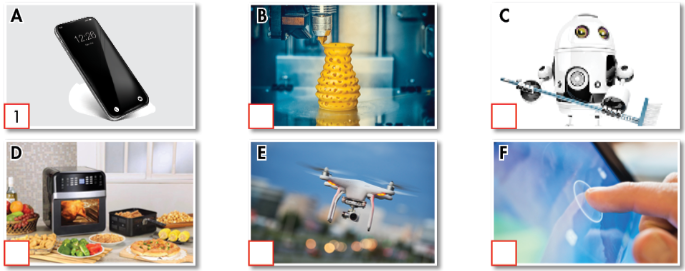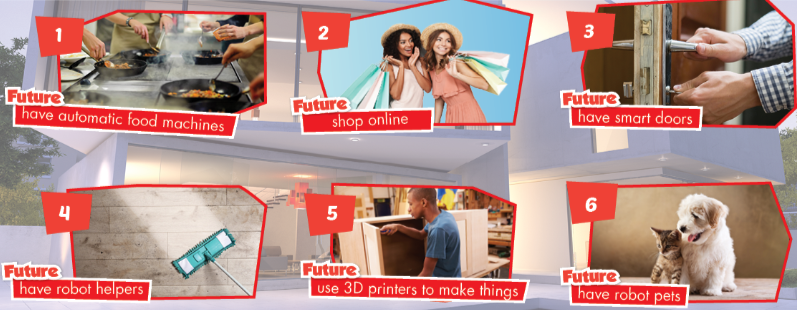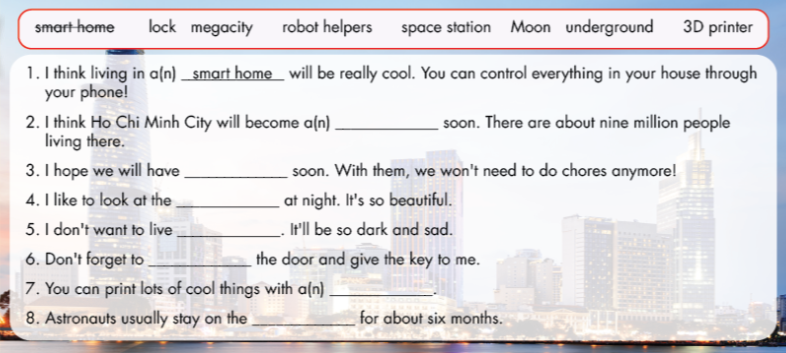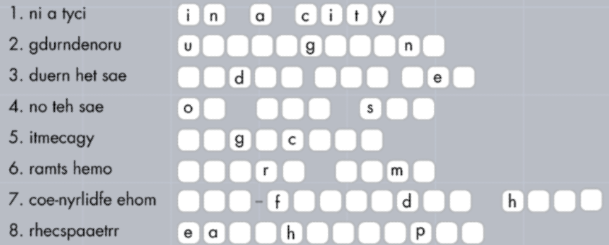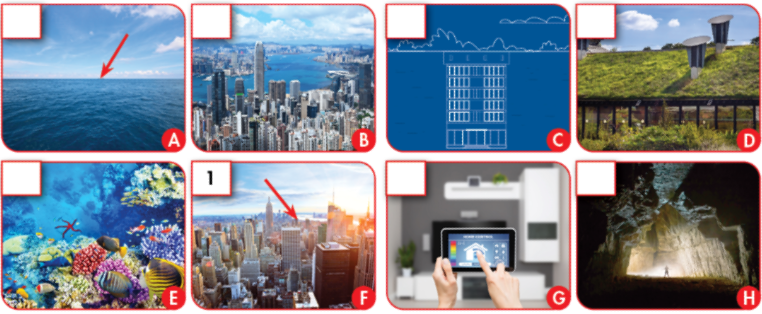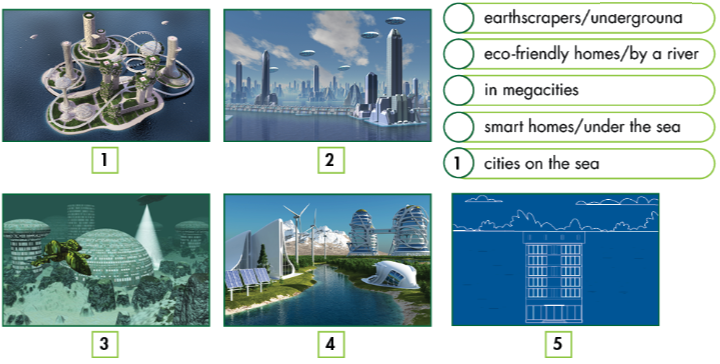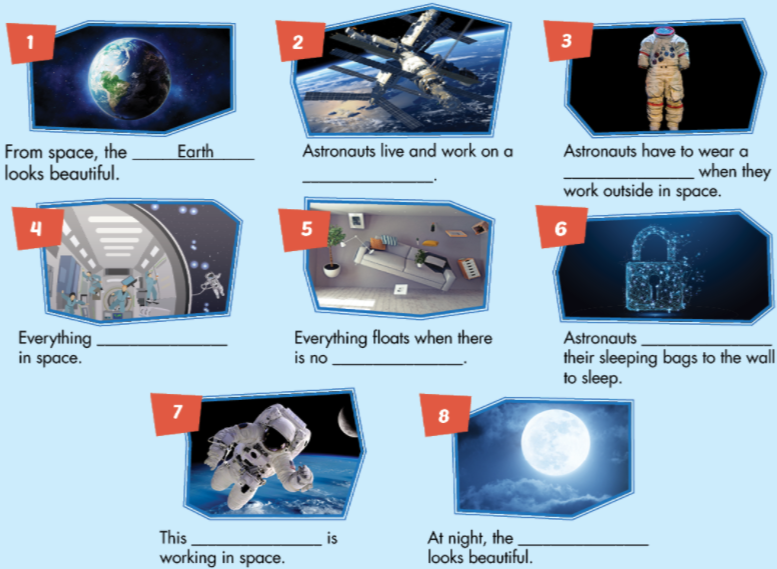Giải SGK, SBT Unit 9. Houses in the Future iLearn Smart World
Giải SGK, SBT Unit 9 iLearn Smart World
a. Fill in the blanks. Listen and repeat.
(Điền vào ô trống. Nghe và lặp lại.)
| in a city underground under the sea on the sea |

| smart home mega city earthscraper eco-friendly home |
5. ___________ - a very large city with more than ten million people living there
6. ___________ - a big apartment building under the ground
7. ___________ - a house with a computer to run it
8. ___________ - a house which is friendly to the environment
b. Now, listen and write “Yes” or “No”.
(Bây giờ, hãy nghe và điền “Có” hoặc “Không”.)
|
1. Many people will live in megacities. |
____________ |
|
2. Many people will live in smart homes. |
____________ |
|
3. Computers will control things in some homes. |
____________ |
|
4. Lots of people will live in the country. |
____________ |
a. Practice the conversation. Swap roles and repeat.
(Thực hành đoạn hội thoại. Đỏi vai và lặp lại.)
|
Emma: Where do you think people will live in the future? (Bạn nghĩ mọi người sẽ sống ở đâu trong tương lai?) Mark: I think a lot of people will live in megacities. (Tôi nghĩ rất nhiều người sẽ sống trong các siêu đô thị.) Emma: Anywhere else? (Còn ở đâu nữa không?) Mark: I think some people will live in homes on the sea. (Tôi nghĩ một số người sẽ sống trong những ngôi nhà trên biển.) Emma: What do you think homes will be like? (Bạn nghĩ những ngôi nhà sẽ như thế nào?) Mark: I think they will be smart homes. (Tôi nghĩ chúng sẽ là những ngôi nhà thông minh.) Emma: Sorry, I don't understand. (Xin lỗi, tôi không hiểu.) Mark: You know. Computers will control things in smart homes. (Bạn biết đấy. Máy tính sẽ điều khiển mọi thứ trong ngôi nhà thông minh.) |
Where? (Ở đâu?) - under the sea (dưới biển) - by rivers (gần sông) - in cities in the sky (thành phố trên bầu trời) - underground (dưới lòng đất) |
What/like? (Trông như thế nào?) - smart homes (nhà thông minh) -eco-friendly home (nhà thân thiện với môi trường) - earthscrapers (thành phố ngầm) |
b. Fill in the blanks using “might” and a verb from the box.
(Điền vào ô trống sử dụng “might” và động từ trong khung.)
|
make shop live change have |
1. Automatic food machines might make all our food.
(Máy thực chế biến phẩm tự động có thể làm tất cả thực phẩm của chúng ta.)
2. We_____________ in smart homes.
3. We _____________ smart doors.
4. We ____________ online and drones will deliver our food.
5. How____________ homes _____________ in the future?
a. You're planning an article for Teen World Magazine on how homes will be different in the future. Discuss and choose four differences you want to write about. Note them below.
(Bạn đang lên kế hoạch cho tạp chí Teen World về những ngôi nhà trong tương lai sẽ khác như thế nào. Thảo luận và chọn ra sự khác nhau bạn muốn viết. Ghi chúng vào bên dưới.)
| HOMES NOW | FUTURE HOMES |
|
- pet cats and dogs - - - |
- robot pets - - - |
a. Fill in the blanks. Listen and repeat.
(Điền vào ô trống. Nghe và lặp lại.)
|
gravity lock float spacesuit the Moon astronaut space station the Earth |
|
1. Things fall to the ground on Earth because of this. (Mọi thứ rơi hướng về Trái đất nhờ điều này.) 2. This is special clothing to wear in space. (Đây là quần áo đặc biệt để mặc trong không gian.) 3. This means to move slowly on water, in the air, or in space. (Điều này có nghĩa là di chuyển chậm trên mặt nước, trên không hoặc trong không gian.) 4. You do this to shut a door with a key. (Bạn làm điều này để đóng cửa bằng chìa khóa.) |
gravity ____________ ____________ ____________ |

a. Read the article and fill the blanks.
(Đọc bài sau và điền vào ô trống.)
|
float astronauts space station gravity |
ASTRONAUTS' DAILY LIFE
Sheldon Levine, October 21
Astronauts' lives are very different on a (1) space station. They cannot have showers because there is no (2) _________ and everything floats in space. The (3) _________ have to use soap and wet towels. They have to use a special toilet, too. Meal times are very different to the ones at home. The astronauts have to eat dried food in bags. They have to sleep in sleeping bags when they are tired. Astronauts tie their sleeping bags to the walls so they don't (4) _________ around. Life in space is not the same as life on Earth.
a. Match the pictures with the words in the box.
(Ghép các hình ảnh với các từ trong khung.)
|
|
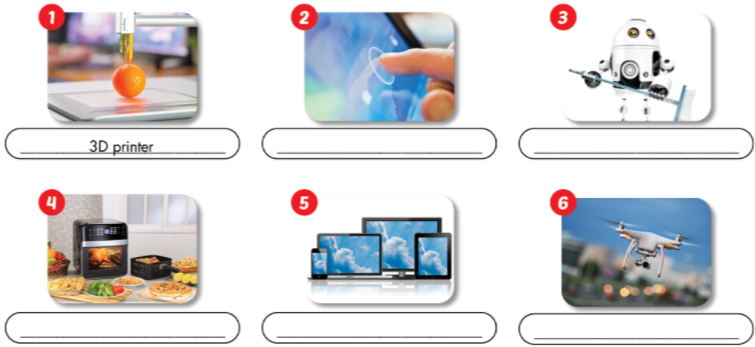
b. Listen again and match the words.
(Lắng nghe và điền các từ.)
|
Now |
|
|
wash clothes |
D |
|
cooking |
|
|
buy bicycles |
|
|
make phone calls |
|
|
see anywhere in the world |
|
Future (Tương lai) |
|
A. smart walls (những bức tường thông minh) |
| B. 3D printers (máy in 3D) |
| C. smart devices (những thiết bị thông minh) |
| D. robot helpers (người máy giúp việc) |
| E. drones (máy bay không người lái) |
c. Fill in the blanks using "might" and a verb from the box.
(Điền vào chỗ trống bằng cách sử dụng "might" và một động từ trong khung.)
|
cook deliver watch do make have |
1. In the future, automatic food machines might cook all our food.
(Trong tương lai, máy chế biến thực phẩm tự động có thể nấu toàn bộ thực ăn cho chúng ta.)
2. In the future, robots all our housework.
3. In the future, we movies on smart walls.
4. In the future, 3D printers all kinds of things.
5. In the future, we many smart devices.
6. In the future, robot drones all our groceries.
Listen and number.
(Lắng nghe và điền số.)
|
Astronauts have to study for a long time. |
|
|
Astronauts have to lock their sleeping bags to the wall. |
|
|
Astronauts need to know how to move where there's no gravity. |
|
|
How do astronauts get their job? |
|
|
Astronauts have to learn some special skills. |
|
|
Astronauts have to wear a spacesuit to go outside. |


